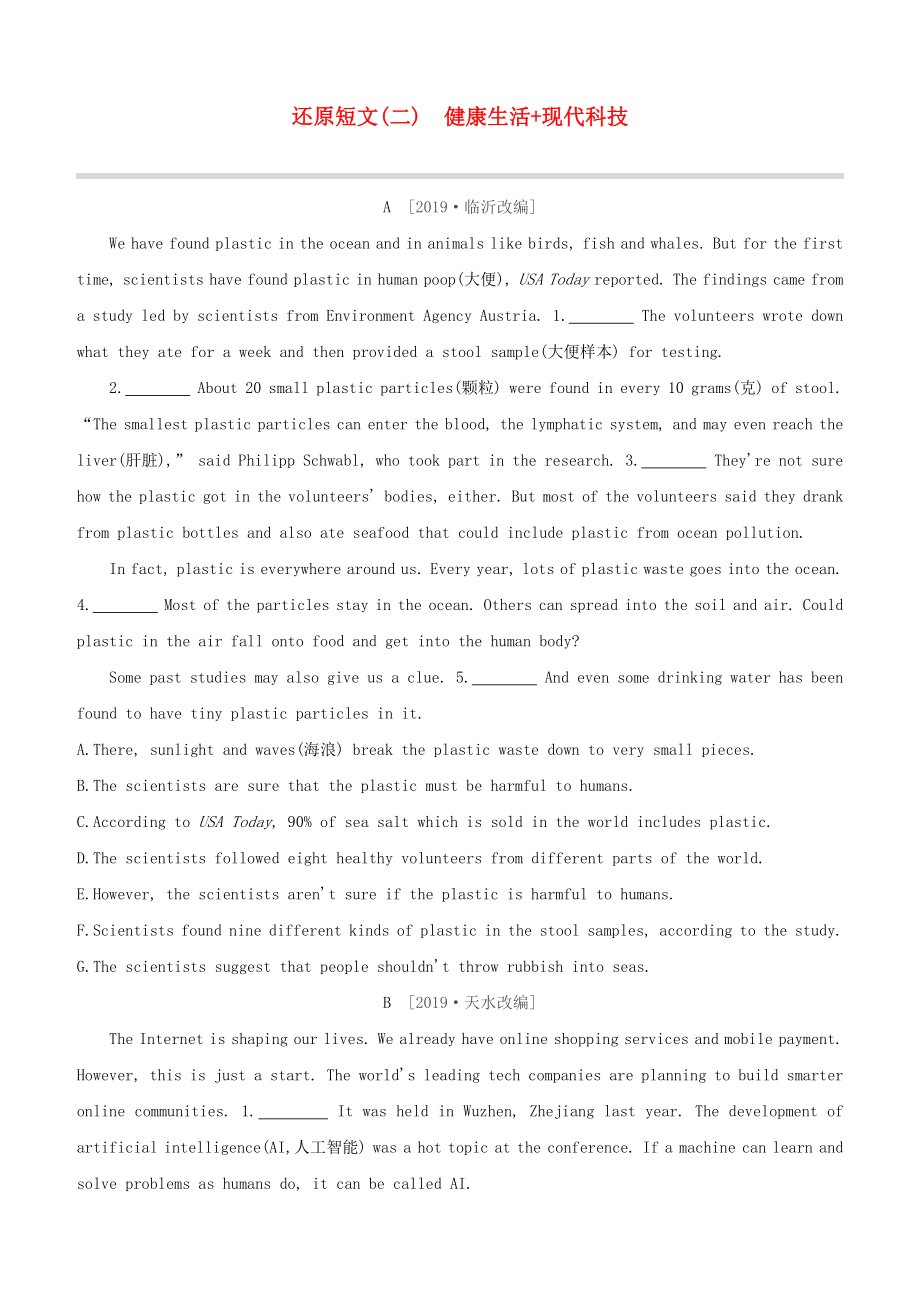《(連云港專版)2020中考英語(yǔ)復(fù)習(xí)方案 第一篇 教材考點(diǎn)梳理 還原短文02 健康生活+現(xiàn)代科技試題》由會(huì)員分享����,可在線閱讀��,更多相關(guān)《(連云港專版)2020中考英語(yǔ)復(fù)習(xí)方案 第一篇 教材考點(diǎn)梳理 還原短文02 健康生活+現(xiàn)代科技試題(4頁(yè)珍藏版)》請(qǐng)?jiān)谘b配圖網(wǎng)上搜索�。
1����、還原短文(二) 健康生活+現(xiàn)代科技
A [2019·臨沂改編]
We have found plastic in the ocean and in animals like birds, fish and whales. But for the first time, scientists have found plastic in human poop(大便), USA Today reported. The findings came from a study led by scientists from Environment Agency
2、Austria. 1. The volunteers wrote down what they ate for a week and then provided a stool sample(大便樣本) for testing.?
2. About 20 small plastic particles(顆粒) were found in every 10 grams(克) of stool. “The smallest plastic particles can enter the blood, the lymphatic system, and may even reach
3����、 the liver(肝臟),” said Philipp Schwabl, who took part in the research. 3. They're not sure how the plastic got in the volunteers' bodies, either. But most of the volunteers said they drank from plastic bottles and also ate seafood that could include plastic from ocean pollution.?
In fact, plasti
4�、c is everywhere around us. Every year, lots of plastic waste goes into the ocean. 4. Most of the particles stay in the ocean. Others can spread into the soil and air. Could plastic in the air fall onto food and get into the human body??
Some past studies may also give us a clue. 5. And even
5、 some drinking water has been found to have tiny plastic particles in it.?
A.There, sunlight and waves(海浪) break the plastic waste down to very small pieces.
B.The scientists are sure that the plastic must be harmful to humans.
C.According to USA Today, 90% of sea salt which is sold in the world
6�、includes plastic.
D.The scientists followed eight healthy volunteers from different parts of the world.
E.However, the scientists aren't sure if the plastic is harmful to humans.
F.Scientists found nine different kinds of plastic in the stool samples, according to the study.
G.The scientists sug
7、gest that people shouldn't throw rubbish into seas.
B [2019·天水改編]
The Internet is shaping our lives. We already have online shopping services and mobile payment. However, this is just a start. The world's leading tech companies are planning to build smarter online communities. 1. It was held i
8�����、n Wuzhen, Zhejiang last year. The development of artificial intelligence(AI,人工智能) was a hot topic at the conference. If a machine can learn and solve problems as humans do, it can be called AI. ?
The company Alibaba uses AI technology in its unmanned supermarket in Wuzhen. There is no salesperson i
9�、n the supermarket, just a tablet on a desk that says “please smile”. 2. The bigger you smile, the more discounts(折扣) you get. Payment is done automatically(自動(dòng)地) through your Alipay(支付寶) account. When you first enter the supermarket, the supermarket's AI recognizes your face and your account. ?
10、There is also AI that can read lips. 3. It recognizes your mouth's movements and turns them into voice or text messages. This could be very useful when you are trying to talk to someone on your phone in a noisy place. Police could also use the technology to help them find criminal suspects by li
11�����、p-reading recordings from video cameras. ?
4. Microsoft's chatbot XiaoIce can not only provide useful information, but also chat with people like a real friend. XiaoIce has a WeChat account. After following the account, users can start talking with her. 5. She keeps improving herself by tal
12、king with users. ?
These technologies are being put into wider use. We may see a smarter world and better lives in the near future.
A.She knows when to comfort you or tell jokes.
B.They discussed this at the World Internet Conference.
C.Another type of Al focuses on understanding human emotions.
13���、
D.If you use your WeChat, you will get an account.
E.If you smile, it will give you a special discount for your goods.
F.Everyone likes to use WeChat to pay for things.
G.Sougou brought its lip-reading system to the conference.
【參考答案】
A
[主旨大意]本文是一篇說明文,通過研究發(fā)現(xiàn),在人類大便中存在塑料顆粒��。
1.D 根據(jù)下文“The
14���、volunteers wrote down what they ate for a week and then provided a stool sample for testing.”可知,志愿者們寫下他們一個(gè)星期都吃了什么,然后提供大便樣本進(jìn)行測(cè)試。從而可推知此處是與志愿者有關(guān)的內(nèi)容,故選D�����。
2.F 根據(jù)下文“About 20 small plastic particles were found in every 10 grams of stool.”可知此處介紹的是科學(xué)家們?cè)诖蟊銟颖局邪l(fā)現(xiàn)了不同的塑料���。故選F���。
3.E 根據(jù)下文“They're not sure how the p
15、lastic got in the volunteers' bodies, either.”特別是句中的either一詞可知,前面也要用否定結(jié)構(gòu),即“科學(xué)家們并不確定這種塑料是否對(duì)人類有害”�����。故選E��。
4.A 根據(jù)上文“Every year, lots of plastic waste goes into the ocean.”和下文“Most of the particles stay in the ocean.”可知,在那里,陽(yáng)光和海浪把塑料垃圾分解成很小的碎片。故選A�。
5.C 根據(jù)“And even some drinking water has been found to hav
16、e tiny plastic particles in it.”可知,據(jù)《今日美國(guó)》報(bào)道,世界上銷售的90%的海鹽都含有塑料�。故選C。
B
[主旨大意]本文是一篇說明文��。文章主要講述了互聯(lián)網(wǎng)正在改變我們的生活,人工智能的發(fā)展給我們帶來(lái)更多的便利�。
1.B 根據(jù)下文“It was held in Wuzhen, Zhejiang last year. The development of artificial intelligence was a hot topic at the conference.”可推知,他們?cè)谑澜缁ヂ?lián)網(wǎng)會(huì)議上討論了這個(gè)問題。故選B����。
2.E 根據(jù)下文“The
17����、 bigger you smile, the more discounts you get. Payment is done automatically through your Alipay account.”可推知,此處應(yīng)與微笑有關(guān),故選E�。
3.G “Sougou brought its lip-reading system to the conference.”中的lip-reading與上句“There is also AI that can read lips.”中的lips相對(duì)應(yīng),且句意連貫,故選G����。
4.C 根據(jù)下文“Microsoft's chatbot XiaoIce
18、can not only provide useful information, but also chat with people like a real friend. XiaoIce has a WeChat account.”可推知,人工智能也專注于人的情感,故選C��。
5.A 根據(jù)上句“After following the account, users can start talking with her.”及下句“She keeps improving herself by talking with users.”可推知,使用者可以與她交流,她可以安慰你或者開玩笑��。故選A��。
 (連云港專版)2020中考英語(yǔ)復(fù)習(xí)方案 第一篇 教材考點(diǎn)梳理 還原短文02 健康生活+現(xiàn)代科技試題
(連云港專版)2020中考英語(yǔ)復(fù)習(xí)方案 第一篇 教材考點(diǎn)梳理 還原短文02 健康生活+現(xiàn)代科技試題

